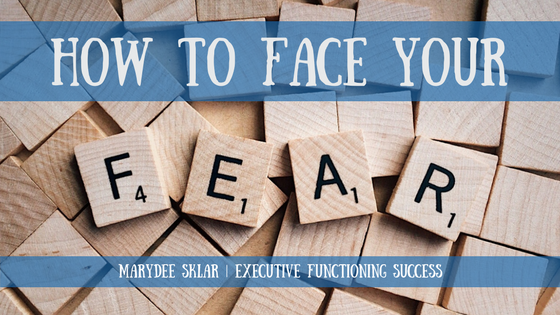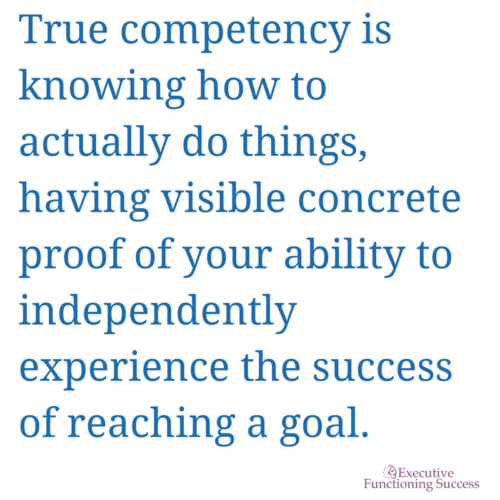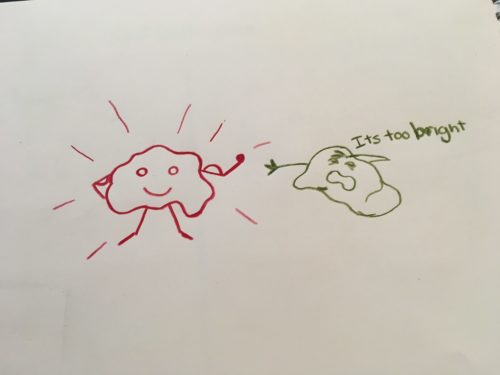- You are here:
- Home »
- Blog »
- Cognitive Functioning
- » Getting Past Fear

Getting Past Fear
I just returned from presenting at the LDA national conference. Dr. Jerome Schultz, a clinical neuropsychologist at Harvard, gave a keynote with the title: Conquering the Fear Factor: Helping Kids with LD & ADHD Turn Stress into the Fuel for Success. Everything he said aligned with what I know about how our executive functions are overridden when we have a brain stuck in fear. We cannot learn. We cannot move purposefully through time if we have what I call a “stuck time-brain,” which is what happens when a brain is constantly flooded with excessive cortisol.
Sources of Fear
In our modern world there are multiple sources of fear and stress that activate the “fight,” “flight” or “freeze” response in our brain, which is designed to protect us and promote our survival under life-threatening situations. It makes sense that traumatic events negatively impact our brain, but what about the effect of “little” everyday stressors? Those of us with ADHD, dyslexia, LD and executive function deficits live with constant fears like these:
 -The fear of being called on in class when you don’t understand the lesson
-The fear of being called on in class when you don’t understand the lesson
-The fear of being asked to read aloud when you have dyslexia
-The fear of angry parents when you don’t do homework because you don’t know how to do it or you lost the assignment
-The fear of failing to meet a project deadline
-The fear of being ridiculed because your brain just doesn’t do something well, like sitting still during the last period of the day or doing math problems in your head
The stress of these “little fears” add up, tipping a brain into an unhealthy state of chronic stress. All that cortisol damages the neuron connections in the brain, which makes a person even less capable of learning and using their executive skills to manage time and life.
We need to realize that living in fear, with excessive cortisol in your brain, means that you are constantly getting this message: “I am NOT capable”. This actually sets up your brain to question your ability to survive, much less thrive.
Now this is a horrible debilitating message. I see it in many of my student and adult clients. And I know it personally. I spent almost 50 years of my life doubting my capability – my very worth. Why? Because the weaknesses in my brain’s executive functions made me feel dumb – despite all the external “proof” available to show otherwise.
The Foundation for Conquering Fear
Dr. Shultz and I are in agreement about how to begin to conquer the dominance of fear. You MUST experience  competence. I’m not talking about building self-esteem with trophies for just showing up. I’m talking about building a brain that has experienced degrees of success. True competency is knowing how to actually do things, having visible concrete proof of your ability to independently experience the success of reaching a goal.
competence. I’m not talking about building self-esteem with trophies for just showing up. I’m talking about building a brain that has experienced degrees of success. True competency is knowing how to actually do things, having visible concrete proof of your ability to independently experience the success of reaching a goal.
It takes conscious effort to rewire a brain from the mindset of “I can’t” to “I can!” With expanding competence we experience control in our lives, and control lowers the stress level in our brain. You effectively wipe out the fear factor in the brain with competence.
How do you build competence?
You rewire your brain – one step at a time.
I am working with a very bright and talented 17-year-old woman who is doing just that. She is moving from an “I can’t” to an “I can!” brain. It’s a process because her brain is deeply trained to go into panic attacks whenever a situation challenges her and makes her feel incompetent.
She is changing her brain’s neuron pathways each time she takes an action like these:
- Makes a to-do list
- Crosses off a completed task
- Writes an assignment in her planner
- Looks at her watch
- Checks a clock
- Turns in an assignment on time
- Emails a teacher to clear up confusion
- Does her evening chores
- Uses a cube timer for motivation
- Writes a check from her own account to pay for her art tutor
- Files a piece of paper where she can easily find it later
 In essence, she is building her brain’s executive function skills by using tools and strategies to take purposeful action. As a result, she proves to herself that she is competent and NOT helpless. It is wonderful to watch her do this.
In essence, she is building her brain’s executive function skills by using tools and strategies to take purposeful action. As a result, she proves to herself that she is competent and NOT helpless. It is wonderful to watch her do this.
After we had a discussion about how she is rewiring her brain, I asked her to make a drawing that represented the concept of switching from “I can’t” to “I can!” She gave me permission to share her drawing, and her name with you – since Elyse is an award winning artist. I love how her competent brain is wearing a Wonder Woman cape and is overwhelming her fearful brain that is slowly dissolving away.
Little by little… we develop mastery and competence.
Let Elyse inspire you to take action to conquer fear.
PS: Elyse is using external tools to support her developing executive functions. We have just updated our website’s Cool Tools resource page that helps you find clocks, timers, etc. as well as books I have found useful to expand our understanding of the the brain and our behavior. Check it out!

About the Author Marydee Sklar
Marydee Sklar is the president of Executive Functioning Success and the creator of the Seeing My Time Program® and the Set Up Success and Seeing My Time® planners. She is an educator and author of three books on executive functions, as well as a trainer and speaker. Marydee has more than twenty-five years of experience working with students and adults with executive function challenges.
